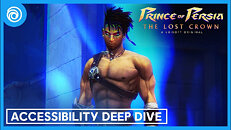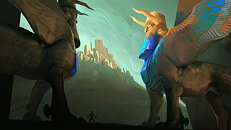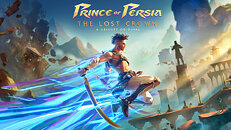T0@st
News Editor
- Joined
- Mar 7, 2023
- Messages
- 2,952 (3.81/day)
- Location
- South East, UK
| System Name | The TPU Typewriter |
|---|---|
| Processor | AMD Ryzen 5 5600 (non-X) |
| Motherboard | GIGABYTE B550M DS3H Micro ATX |
| Cooling | DeepCool AS500 |
| Memory | Kingston Fury Renegade RGB 32 GB (2 x 16 GB) DDR4-3600 CL16 |
| Video Card(s) | PowerColor Radeon RX 7800 XT 16 GB Hellhound OC |
| Storage | Samsung 980 Pro 1 TB M.2-2280 PCIe 4.0 X4 NVME SSD |
| Display(s) | Lenovo Legion Y27q-20 27" QHD IPS monitor |
| Case | GameMax Spark M-ATX (re-badged Jonsbo D30) |
| Audio Device(s) | FiiO K7 Desktop DAC/Amp + Philips Fidelio X3 headphones, or ARTTI T10 Planar IEMs |
| Power Supply | ADATA XPG CORE Reactor 650 W 80+ Gold ATX |
| Mouse | Roccat Kone Pro Air |
| Keyboard | Cooler Master MasterKeys Pro L |
| Software | Windows 10 64-bit Home Edition |
Prince of Persia: The Lost Crown launches on January 18 (or on January 15 for Ubisoft+ subscribers and owners of the Digital Deluxe Edition), whether you're playing on PC, Nintendo Switch, PlayStation 5, PlayStation 4, Xbox Series X|S, Xbox One, or Amazon Luna. The game offers up challenging combat and platforming, but the development team at Ubisoft Montpellier want to ensure that as many people as possible are able to play.
About Prince of Persia The Lost Crown:
Dash into a stylish and thrilling action-adventure platformer set in a mythological Persian world where the boundaries of time and space are yours to manipulate.
Play as Sargon and evolve from sword-wielding prodigy to extraordinary legend as you master acrobatic combat and unlock new Time Powers and unique super abilities.



Thanks to Ubisoft Montpellier, more players can enjoy Prince of Persia: The Lost Crown through features like Guided Mode, 'Memory Shards' to pin screenshots on the map, High Contrast, Combat Difficulty, and more! Learn about the team's approach to accessibility and check it out in the Free Demo on January 11.
To learn more about how Ubisoft Montpellier is making Prince of Persia: The Lost Crown accessible, we spoke to Senior Game Designer Rémi Boutin.
What was your approach to accessibility on Prince of Persia: The Lost Crown?
Rémi Boutin: Accessibility was an early consideration for us. We integrated it into the creative vision for the game and approached it from several angles. We applied design thinking around the specific barriers and opportunities that our genre and game presents, referenced existing good practices and guidance, and worked in close collaboration with the internal accessibility team at Ubisoft. Learning directly from the audience though user research has been very important as well, and is something that we plan to continue during the rest of development to help to refine our feature set.
Does the game's genre bring any unique challenges?
RB: Games with similar mechanics to Prince of Persia: The Lost Crown are not always known for accessibility, so we wanted to explore ways to make our game enjoyable by the greatest number of players.
We identified exploration as a key part of this. Ensuring players can feel the thrill of free exploration without the frustration of feeling lost was a strong area of focus for us from the very start of development. We have an optional guided mode to help with this, which shows objectives and blocked/available paths. But we also approached it through design, in particular with a feature that we hope our players will enjoy - Eye of the Wanderer.
The genre is quite dependent on being able to "take mental notes"; remembering and visualizing things like blocked paths, or situations that need tools or powers that you don't have. We know that can be a barrier for some players, so to assist with this the Eye of the Wanderer feature allows you to take a screenshot and pin it to the map as a visual reminder.
Our game offers combat depth, and we're aiming for a challenging game, for players to experience the satisfaction of overcoming dangerous enemies. But we know that people are varied and that challenging means different things to different people. So, we are providing both difficulty presets and a range of individual parameters, so that more people can experience a challenge that fits their capabilities.

Did working as a smaller team affect the approach to accessibility?
RB: Being a smaller team doesn't need to get in the way of considering accessibility. Smaller teams even have some advantages, like agility. Rather than accessibility being handled by certain people on the team, everyone is involved to ensure that the features that they're personally working on are accessible, as well as looking out for potential accessibility issues across the game in general.
Another good way to work efficiently is to look for ways to avoid unnecessary barriers by default, through design choices rather than options. And there are other benefits to accessibility-by-design too, like discoverability. We were able to do this in several areas. For example, color-blindness, text presentation and QTEs (quick time events) are all addressed by default.
It's also important to start thinking about accessibility as early as possible in development, it means you're able to do more and do it more effectively. Ubisoft's processes encourage and support considering accessibility early, and it's something that really made a big difference for us. We were able to make good progress even by alpha.
We're excited to be able to offer this first look at accessibility alongside the announcement of the game, being able to do that means a lot to us as a team. Considering accessibility from early in development is what has allowed us to share it with you today.

ACCESSIBILITY FEATURES LIST:
VISUALS
AUDIO
NAVIGATION & GUIDANCE
The Eye of the Wanderer - pin screenshots to the map.
Guided mode - optional icons marking objectives and available/blocked paths.
Reminder of important controls is shown on-screen during gameplay.
(NEW) Practice area with no consequences of failure, and tutorials.
(NEW) Platforming assist - optional portal to skip past challenging sections of platforming.
(NEW) Interactive elements can be given extra highlighting.
CONTROLS
COMBAT
Prince of Persia launches on January 18 (or on January 15 for Ubisoft+ subscribers and owners of the Digital Deluxe Edition), whether you're playing on PC, Nintendo Switch, PlayStation 5, PlayStation 4, Xbox Series X|S, Xbox One, or Amazon Luna.
View at TechPowerUp Main Site | Source
About Prince of Persia The Lost Crown:
Dash into a stylish and thrilling action-adventure platformer set in a mythological Persian world where the boundaries of time and space are yours to manipulate.
Play as Sargon and evolve from sword-wielding prodigy to extraordinary legend as you master acrobatic combat and unlock new Time Powers and unique super abilities.



Thanks to Ubisoft Montpellier, more players can enjoy Prince of Persia: The Lost Crown through features like Guided Mode, 'Memory Shards' to pin screenshots on the map, High Contrast, Combat Difficulty, and more! Learn about the team's approach to accessibility and check it out in the Free Demo on January 11.
To learn more about how Ubisoft Montpellier is making Prince of Persia: The Lost Crown accessible, we spoke to Senior Game Designer Rémi Boutin.
What was your approach to accessibility on Prince of Persia: The Lost Crown?
Rémi Boutin: Accessibility was an early consideration for us. We integrated it into the creative vision for the game and approached it from several angles. We applied design thinking around the specific barriers and opportunities that our genre and game presents, referenced existing good practices and guidance, and worked in close collaboration with the internal accessibility team at Ubisoft. Learning directly from the audience though user research has been very important as well, and is something that we plan to continue during the rest of development to help to refine our feature set.
Does the game's genre bring any unique challenges?
RB: Games with similar mechanics to Prince of Persia: The Lost Crown are not always known for accessibility, so we wanted to explore ways to make our game enjoyable by the greatest number of players.
We identified exploration as a key part of this. Ensuring players can feel the thrill of free exploration without the frustration of feeling lost was a strong area of focus for us from the very start of development. We have an optional guided mode to help with this, which shows objectives and blocked/available paths. But we also approached it through design, in particular with a feature that we hope our players will enjoy - Eye of the Wanderer.
The genre is quite dependent on being able to "take mental notes"; remembering and visualizing things like blocked paths, or situations that need tools or powers that you don't have. We know that can be a barrier for some players, so to assist with this the Eye of the Wanderer feature allows you to take a screenshot and pin it to the map as a visual reminder.
Our game offers combat depth, and we're aiming for a challenging game, for players to experience the satisfaction of overcoming dangerous enemies. But we know that people are varied and that challenging means different things to different people. So, we are providing both difficulty presets and a range of individual parameters, so that more people can experience a challenge that fits their capabilities.

Did working as a smaller team affect the approach to accessibility?
RB: Being a smaller team doesn't need to get in the way of considering accessibility. Smaller teams even have some advantages, like agility. Rather than accessibility being handled by certain people on the team, everyone is involved to ensure that the features that they're personally working on are accessible, as well as looking out for potential accessibility issues across the game in general.
Another good way to work efficiently is to look for ways to avoid unnecessary barriers by default, through design choices rather than options. And there are other benefits to accessibility-by-design too, like discoverability. We were able to do this in several areas. For example, color-blindness, text presentation and QTEs (quick time events) are all addressed by default.
It's also important to start thinking about accessibility as early as possible in development, it means you're able to do more and do it more effectively. Ubisoft's processes encourage and support considering accessibility early, and it's something that really made a big difference for us. We were able to make good progress even by alpha.
We're excited to be able to offer this first look at accessibility alongside the announcement of the game, being able to do that means a lot to us as a team. Considering accessibility from early in development is what has allowed us to share it with you today.

ACCESSIBILITY FEATURES LIST:
VISUALS
- Colorblind-accessible by design
- Text presentation designed at a size suitable for both living room and hand-held use, in a clear sans-serif font and on plain contrasting backgrounds.
- (NEW) Alternative font for people with different reading preferences.
- (NEW) High contrast settings - remove all color from the background, apply plain bright colors to important gameplay elements (e.g. players, enemies, traps), or both. Multiple preset combinations of colors for gameplay elements.
- (NEW) Adjustable HUD size.
- (NEW) Screen shake can be disabled.
AUDIO
- Subtitles are on by default, and players can choose the opacity of the background (none/half/full).
- Separate volume sliders for master, music, SFX, voiceover, and interface sounds.
- No important information is communicated through sound alone.
- (NEW) Text log - scroll back through the last 50 lines of conversation.
NAVIGATION & GUIDANCE
The Eye of the Wanderer - pin screenshots to the map.
Guided mode - optional icons marking objectives and available/blocked paths.
Reminder of important controls is shown on-screen during gameplay.
(NEW) Practice area with no consequences of failure, and tutorials.
(NEW) Platforming assist - optional portal to skip past challenging sections of platforming.
(NEW) Interactive elements can be given extra highlighting.
CONTROLS
- Multiple input devices - both keyboard/mouse and gamepad support on PC.
- (NEW) Remapping of gameplay controls for gamepad and keyboard.
- Sticks can be swapped.
- X and Y axis inversion for both sticks.
- Vibration intensity can be adjusted or turned off.
- No QTEs (quick time events).
- Button mashing can be auto-completed
COMBAT
- Several difficulty presets.
- (NEW) 4 difficulty presets, with display of the parameters affected. Can be modified at any time.
- Individual parameters can be adjusted:
- Enemy damage.
- Enemy health.
- (NEW) Environmental hazards damage.
- (NEW) Parry timing and dodge window.
- Athra (special attacks) charge and deplete rate.
- (NEW) Melee targeting assist - option to automatically turn the character in the direction of the enemy.
- (NEW) Aim assist - option to increase the aim assist on weapons and powers that use targeting.
- Practice area with no consequences of failure, and tutorials.
Prince of Persia launches on January 18 (or on January 15 for Ubisoft+ subscribers and owners of the Digital Deluxe Edition), whether you're playing on PC, Nintendo Switch, PlayStation 5, PlayStation 4, Xbox Series X|S, Xbox One, or Amazon Luna.
View at TechPowerUp Main Site | Source
